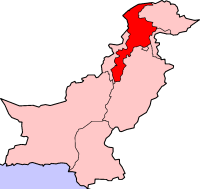Bombing
The bomber was outside the training academy when he exploded his car at about 6 am local time. Most of those killed were men waiting to go home after completing 6 months of training. Mohammad Sardar, who was wounded in the head and admitted to the Lady Reading Hospital in Peshawar, said: "There are two occasions in one’s life to celebrate: wedding and going home on vacations at the end of six months of training. So we were all happy, celebrating the occasion, with bedrolls on our heads, thinking of home, when the first explosion occurred, followed by a second." [3]
Reactions
In financial markets, the yen rose following the attack on concern of increased instability and as the yen is generally considered a stable refuge. [6]
 Within Pakistan, the attack was condemned by the President, Prime Minister and other political figures. MQM chief Altaf Hussain expressed sorrow and regret over the loss of lives. The Chief Minister of Sindh Syed Qaim Ali Shah also expressed his sympathy. [7]
Within Pakistan, the attack was condemned by the President, Prime Minister and other political figures. MQM chief Altaf Hussain expressed sorrow and regret over the loss of lives. The Chief Minister of Sindh Syed Qaim Ali Shah also expressed his sympathy. [7]
 In a telephone conversation with Prime Minister Yousaf Raza Gillani, British Prime Minister David Cameron expressed his condolences over the attack, assured his support to Pakistan and said that the United Kingdom knew well Islamabad was facing political turmoil, which was heavily taking a toll on its men and material. [8]
In a telephone conversation with Prime Minister Yousaf Raza Gillani, British Prime Minister David Cameron expressed his condolences over the attack, assured his support to Pakistan and said that the United Kingdom knew well Islamabad was facing political turmoil, which was heavily taking a toll on its men and material. [8]
Gillani stated: "Pakistan is committed to working with the rest of the world to eradicate terrorism. It will also take care of its national interests." [8]
 The United States embassy in Pakistan condemned the attack. "We extend our condolences to the Pakistan Armed Forces, and families and friends of the victims. Terrorists have shown time and again that they are the true enemy of the people and government of Pakistan," a statement from the embassy said. [9]
The United States embassy in Pakistan condemned the attack. "We extend our condolences to the Pakistan Armed Forces, and families and friends of the victims. Terrorists have shown time and again that they are the true enemy of the people and government of Pakistan," a statement from the embassy said. [9]
This page is based on this
Wikipedia article Text is available under the
CC BY-SA 4.0 license; additional terms may apply.
Images, videos and audio are available under their respective licenses.
